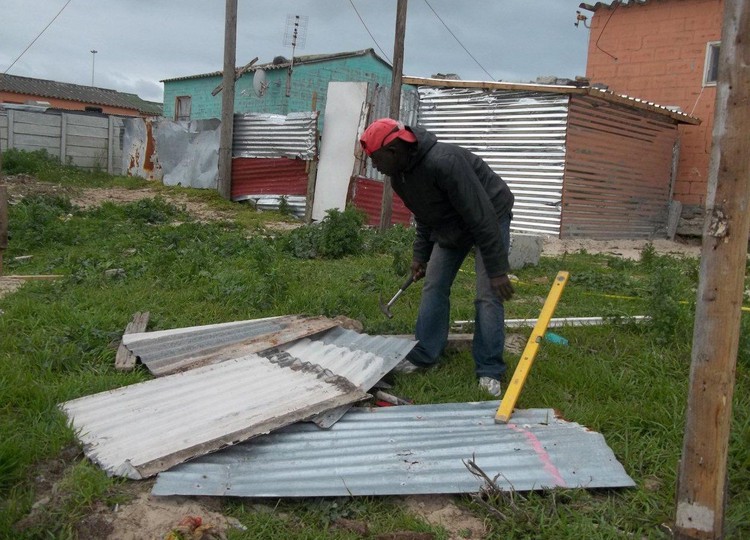Short of money and desperate, Khayelitsha residents start land occupation
“Sometimes we sleep on empty stomachs because we have no food”
People have begun moving onto vacant City-owned land in an area called Mpukwini in Makhaza, Khayelitsha, since Sunday.
When GroundUp visited the site on Sunday, one person was building a shack, while dozens of others had marked plots with wood and strips of plastic bags. Some dug shallow trenches around their plots to set them apart from others.
By the next day, the residents had built about five shacks. Others were still busy building.
The stories of Nokuthula Mbala and Paulos Wati show the varied reasons why people take part in illegal land occupations.
Mbala lives with her husband and three young children. Until last Thursday she lived in Island informal settlement in Makhaza. But her shack flooded in the winter rains. She had tried to prevent water getting in, by placing mounds of sand around the shack, but it was in vain.
Returning from the toilet, she found her three-year-old daughter lying in a puddle after she had tried to pick up her younger sister. Mbala had had enough. “It broke my heart to see my kids wallow in the swamp and made me realise that the floods were endangering their health,” she said.
She cannot afford to rent elsewhere. “We live on my children’s social grants because my husband doesn’t work,” said Mbala.
Wati, who lives with his girlfriend and two children, was building his shack when we spoke to him. He was using materials he received from people living nearby.
“I rent a shack that belongs to my landlord, so I can’t dismantle and re-erect it here,” he said.
His landlords are an elderly couple who live on their pensions and on his rent money. He gets irregular work as a builder and will go almost anywhere in the Western Cape if offered a job.
“I wait for bosses to call me and say they have a piece job for me, otherwise I don’t work,” he said.
But he has not had a job for about two months because of the continuous winter rains and his landlords want their R550 monthly rent, which he cannot pay.
“My landlords demand that I give them their money now so that they can buy food. They don’t care whether I have landed work or not,” he said.
So they ordered him to leave. “I worry about my kids and wonder where they will sleep,” he said. “Because we use our kids’ social grant money to pay rent, they have no shoes or food to eat.”
Wati said he buys clothes for his children from roadside stands because retailers are too expensive for him. His girlfriend does laundry for township residents to make money.
“Sometimes we sleep on empty stomachs because we have no food.”
Support independent journalism
Donate using Payfast

Don't miss out on the latest news
We respect your privacy, and promise we won't spam you.
Next: From drought to floods for Cape Town
Previous: Veld fire causes Rhodes University to evacuate residences
© 2019 GroundUp.
This article is licensed under a Creative Commons Attribution-NoDerivatives 4.0 International License.
You may republish this article, so long as you credit the authors and GroundUp, and do not change the text. Please include a link back to the original article.

